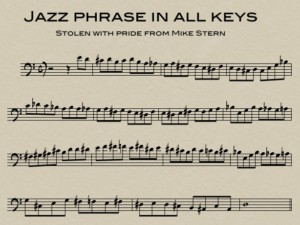
Here’s an overview to make sure you have more time to practice trombone:
- Introduction to Standard Repertoire Trombone Excerpts
- Beginner Level Trombone Excerpts
- Intermediate Level Trombone Excerpts
- Advanced Level Trombone Excerpts
- Master Level Trombone Excerpts
- Approaches to Practicing Trombone Excerpts
- Mastering Techniques for Trombone Excerpts
- Common Mistakes to Avoid in Trombone Excerpts
- Preparing for Trombone Excerpts Auditions
- Resources for Further Study
Introduction to Standard Repertoire Trombone Excerpts
Standard repertoire trombone excerpts play a crucial role in the development and assessment of trombonists across all skill levels. These excerpts are commonly featured in auditions for orchestras, bands, and other musical ensembles, serving as a benchmark for evaluating technical proficiency, musicality, and interpretive skills. Whether preparing for a professional audition or enhancing one’s overall musicianship, familiarity with standard repertoire trombone excerpts is essential for every trombonist.
In this section, trombonists will explore a curated selection of standard repertoire trombone excerpts categorized by skill level. Each excerpt presents unique challenges and opportunities for trombonists to showcase their abilities in areas such as tone production, articulation, dynamics, phrasing, and stylistic interpretation. By studying and mastering these excerpts, trombonists can strengthen their playing techniques, expand their musical repertoire, and gain valuable insights into the underlying compositions.
With a focus on both traditional and contemporary repertoire, this guide aims to provide trombonists with a comprehensive overview of essential excerpts that are frequently encountered in auditions, performances, and educational settings. By delving into the diverse range of musical styles and genres represented in standard repertoire trombone excerpts, trombonists can hone their skills, refine their musical expression, and elevate their overall musicianship to new heights.
Whether approaching these excerpts for the first time or seeking to deepen their understanding and interpretation, trombonists of all skill levels will find valuable resources and insights to inspire their practice and performance endeavors.Embarking on this exploration of standard repertoire trombone excerpts is not only a journey of musical discovery but also a pathway to personal and artistic growth for trombonists dedicated to mastering their craft.
Beginner-level Trombone Excerpts
When delving into beginner-level trombone excerpts, it is essential to start with pieces that offer a foundational understanding of the instrument and basic musical concepts. These excerpts cater to those who are just beginning their journey with the trombone and are looking to build a solid repertoire. Here are some standard beginner-level trombone excerpts to explore:
- “Marche Militaire” by Franz Schubert: This piece is a classic march that provides an excellent introduction to playing in a marching band style. It features simple melodies and rhythms, making it ideal for beginners to practice phrasing and articulation.
- “Minuet in G” by Johann Sebastian Bach: This elegant and graceful minuet is a popular choice for beginner trombonists. It offers opportunities to work on tone production, dynamics, and musical expression.
- “Ode to Joy” by Ludwig van Beethoven: This iconic melody from Beethoven’s Ninth Symphony is a great way for beginners to practice playing in a lyrical style. Focus on shaping phrases and paying attention to dynamics to capture the essence of this timeless piece.
- “Aura Lee”: A beautiful American folk melody that allows beginners to work on legato playing and developing a smooth, connected sound. This piece also presents opportunities to practice intonation and breath control.
These beginner-level trombone excerpts serve as stepping stones for novice players to hone their skills and build a strong musical foundation. By practicing these pieces diligently, beginners can progress to more advanced repertoire and continue to grow as trombone players.
Intermediate Level Trombone Excerpts
For trombone players looking to expand their repertoire and skills, tackling intermediate-level trombone excerpts is a pivotal step in their musical journey. These excerpts are typically more challenging and require a higher level of technical proficiency and musicality compared to beginner-level pieces. Here are some standard intermediate-level trombone excerpts that players should consider mastering:
- Samuel Barber’s “Medea’s Dance of Vengeance”: This piece calls for precision in articulation and dynamic control, making it an excellent selection for developing technical skills.
- Gustav Mahler’s Symphony No. 3, 1st Movement (opening solo): Playing Mahler’s melodic and expressive phrases in this excerpt will help players refine their tone quality and phrasing.
- Hector Berlioz’s “Hungarian March” from “The Damnation of Faust”: This excerpt challenges trombonists with rapid articulation, dynamic contrasts, and a variety of musical styles.
- Richard Strauss’s “Don Juan”: Known for its demanding technical passages and lyrical sections, mastering this excerpt will enhance a player’s agility and breath control.
- Claude Debussy’s “La Mer” (1st movement, opening): Playing this excerpt requires a delicate touch and a keen sense of phrasing to capture the nuances of Debussy’s impressionistic style.
- Maurice Ravel’s “Bolero” (opening solo): This excerpt showcases a player’s ability to maintain a steady tempo and dynamic intensity throughout the repetitive motif.
These intermediate-level trombone excerpts provide a diverse range of musical challenges that can help players further develop their technique, musical interpretation, and overall musicianship. By studying and mastering these excerpts, trombonists can continue to grow their skills and prepare for more advanced repertoire in the future.
Advanced Level Trombone Excerpts
For trombone players looking to challenge themselves with more complex and demanding pieces, the Advanced Level Trombone Excerpts are the perfect choice. These excerpts are typically drawn from the most renowned and challenging orchestral repertoire, requiring a high level of technical proficiency and musical interpretation.
Key Repertoire Pieces at the Advanced Level:
- Mahler Symphony No. 3, Movement 1: This excerpt features rapid technical passages and requires a deep understanding of Mahler’s unique style.
- Strauss’ Don Quixote: Known for its lyrical melodies and intricate solo passages, this piece demands both technical mastery and expressive storytelling.
- Bruckner Symphony No. 4, Movement 4: With its powerful brass chorales and expansive lyrical lines, this excerpt showcases the trombone’s versatility and dynamic range.
- Ravel’s Bolero: This iconic piece presents a rhythmic challenge for trombonists, requiring precision and stamina to maintain the repetitive motif throughout the piece.
Practice Tips for Advanced Excerpts:
- Focus on Technical Accuracy: Work on precise articulation, intonation, and dynamic control to master the intricate passages.
- Study the Score: Understand the context of the excerpt within the full orchestral score to enhance interpretation and musical phrasing.
- Physical Endurance: Build stamina through long-tone exercises and consistent practice to tackle the demanding musical phrases effectively.
Benefits of Tackling Advanced Excerpts:
- Musical Growth: Challenging repertoire pushes players to expand their technical skills and musicality.
- Performance Opportunities: Mastery of advanced excerpts opens doors to high-level orchestral and solo performance opportunities.
- Personal Achievement: Successfully mastering complex pieces offers a sense of accomplishment and satisfaction in personal musical development.
Advanced Level Trombone Excerpts will take your playing to new heights and explore the depths of the trombone’s expressive capabilities.
Master Level Trombone Excerpts
Master-level trombone excerpts are the pinnacle of technical and musical challenges for trombonists. These excerpts are often found in audition repertoire for professional orchestras and advanced ensembles. Here are some standard repertoire trombone excerpts that test the skills of expert-level trombonists:
- “Ride of the Valkyries” from Die Walküre by Richard Wagner
This excerpt demands mastery of both technical agility and dynamic control. Trombonists must navigate challenging intervals and articulations while maintaining a powerful sound that can cut through the orchestral texture. - “Bolero” by Maurice Ravel
The trombone solo in “Bolero” requires exceptional endurance and control. Trombonists must sustain a gradual crescendo over a repetitive ostinato, showcasing their ability to build intensity and maintain a consistent sound quality. - “Symphony No. 9” by Ludwig van Beethoven
The fourth movement of Beethoven’s Symphony No. 9 contains an iconic trombone solo that showcases the instrument’s lyrical qualities. Trombonists must deliver a beautifully phrased melody with impeccable intonation and expression. - “Pictures at an Exhibition” by Modest Mussorgsky
The “Bydlo” movement from Mussorgsky’s suite features a technically demanding solo for the trombone. Trombonists must demonstrate their agility and control in executing rapid passages and leaps across the instrument’s range.
Master-level trombone excerpts push the boundaries of technical proficiency and musical expression, requiring trombonists to showcase their virtuosity and artistry at the highest level.
Approaches to Practicing Trombone Excerpts
When it comes to mastering trombone excerpts, there are several effective approaches that players can use based on their skill level.
- Beginner Level: Beginners should start by focusing on basic techniques such as tone production, articulation, and breathing. When practicing excerpts, they can break them down into smaller sections to work on gradually improving their accuracy and phrasing.
- Intermediate Level: Intermediate players can benefit from practicing excerpts with a metronome to work on their timing and rhythmic precision. They should also focus on dynamics and expression to bring the music to life. Recording and listening back to their practice sessions can help identify areas for improvement.
- Advanced Level: Advanced players should aim to perfect their technical skills and musical interpretation of the excerpts. This can involve practicing at different tempos, experimenting with various articulations, and refining phrasing and dynamics to convey the mood of the music accurately. Collaborating with other musicians or seeking feedback from a mentor can provide valuable insights for further improvement.
By tailoring their practice approaches to their respective skill levels, trombone players can effectively hone their abilities and showcase their musical proficiency in performances and auditions.
Mastering Techniques for Trombone Excerpts
Mastering techniques for trombone excerpts requires dedication and practice. Here are some key tips to help trombone players enhance their skills in tackling standard repertoire excerpts:
- Long Tones: Practice long tones to improve tone quality and control. Focus on sustaining a consistent sound throughout each note.
- Lip Slurs: Work on lip slurs to develop flexibility and agility in playing different intervals smoothly.
- Articulation: Practice various articulations such as staccato, legato, and accents to enhance clarity and precision in playing excerpts.
- Dynamic Control: Focus on mastering dynamic contrasts to effectively convey the nuances of the music.
- Breathing Exercises: Incorporate breathing exercises to improve breath control and sustain phrases effectively.
- Sight-Reading: Regularly practice sight-reading to become proficient in quickly interpreting and performing new excerpts.
- Recording Yourself: Record your practice sessions to analyze your performance objectively and identify areas for improvement.
- Seek Feedback: Work with a private instructor or participate in masterclasses to receive valuable feedback and guidance on refining your skills.
By incorporating these techniques into your regular practice routine and approaching each excerpt with focus and attention to detail, you can enhance your performance abilities and master standard repertoire trombone excerpts with confidence and proficiency.
Common Mistakes to Avoid in Trombone Excerpts
- Rushing through technically challenging passages without proper articulation can result in missed notes and a lack of clarity in the music.
- Neglecting dynamics and musical expression will make the performance sound flat and uninspired.
- Failing to pay attention to phrasing and musical shaping can lead to a disjointed and fragmented interpretation of the excerpt.
- Overlooking breath control and pacing can result in running out of breath during longer phrases, leading to a compromised sound quality.
- Ignoring proper intonation and tuning can detract from the overall tonal quality and blend in ensemble playing.
- Neglecting to practice with a metronome can result in rhythmic inconsistencies and a lack of precision in tempo changes within the excerpt.
- Not taking the time to study the context and historical background of the piece can lead to a shallow understanding and interpretation of the music.
- Focusing solely on technical aspects without considering musical expression and interpretation can result in a mechanical and unengaging performance.
Preparing for Trombone Excerpts Auditions

For trombone players aiming to excel in auditions for orchestras, bands, or music schools, thorough preparation for trombone excerpts is crucial. Effective preparation involves a combination of technical skills, musical interpretation, and mental readiness. Here are some essential steps to help you prepare for trombone excerpts auditions:
- Study the Excerpts: Start by selecting and studying the required excerpts thoroughly. Understand the context, style, and historical background of each piece to interpret them accurately.
- Focus on Technique: Work on technical aspects such as articulation, intonation, dynamics, and phrasing. Practice scales, arpeggios, and other technical exercises to improve overall playing ability.
- Get Feedback: Seek feedback from experienced trombone players, instructors, or mentors. Their input can provide valuable insights and help you refine your performance.
- Mock Auditions: Conduct mock auditions to simulate the audition environment and build confidence. Practice performing the excerpts in front of an audience to familiarize yourself with the pressure of the audition setting.
- Record and Evaluate: Record your practice sessions and audition mock-ups to assess your performance objectively. Identify areas that need improvement and work on refining them.
- Manage Stress: Develop strategies to manage audition stress and anxiety. Techniques such as deep breathing, positive visualization, and mental rehearsal can help you stay calm and focused during auditions.
By following these steps and dedicating consistent time and effort to practice, you can enhance your performance and increase your chances of success in trombone excerpts auditions. Remember, preparation is key to achieving your musical goals and showcasing your talent effectively.
Resources for Further Study
- Online Resources: There are various websites dedicated to trombone technique, repertoire, and orchestral excerpts such as orchestraexcerpts.com and yeodoug.com
- Trombone Method Books: Investing in method books like “Arban’s Complete Method for Trombone” or “Rochut’s Melodious Etudes for Trombone” can greatly benefit aspiring trombone players. These books provide exercises, etudes, and practice routines to improve technique and musicality.
- Orchestral Excerpt Books: Such books are essential for trombonists preparing for auditions or looking to explore standard repertoire.
- Private Lessons: Taking private lessons with a professional trombonist will provide personalized feedback, guidance, and mentorship. Working one-on-one with an experienced instructor can help identify strengths and weaknesses, set specific goals, and tailor practice routines to individual needs.
- Trombone Workshops and Masterclasses: Attending trombone workshops, masterclasses, and summer programs can offer valuable learning opportunities. These events often feature renowned trombonists as faculty, providing unique insights, performance opportunities, and a chance to network with other musicians.
- Recording Analysis: Studying recordings of master trombonists performing standard repertoire excerpts can offer inspiration and insight into interpretation, phrasing, and style. Analyzing different recordings and comparing interpretations can help develop a deeper understanding of the music.
- Music Theory and Ear Training: Improving music theory knowledge and ear training skills can enhance a trombonist’s ability to interpret and perform standard repertoire excerpts. Understanding harmonic progressions, form, and musical structure can lead to more informed and musically engaging performances.
Good luck reaching your goals when it comes to trombone excerpts, and as always – slide on!





